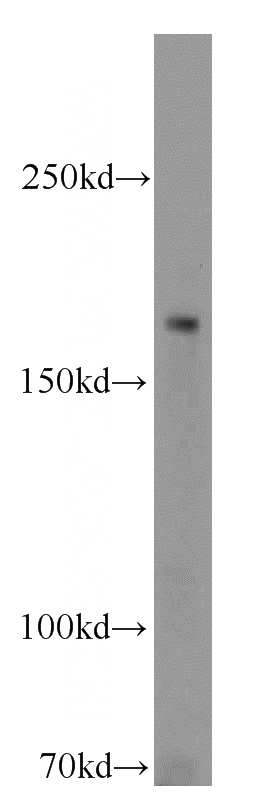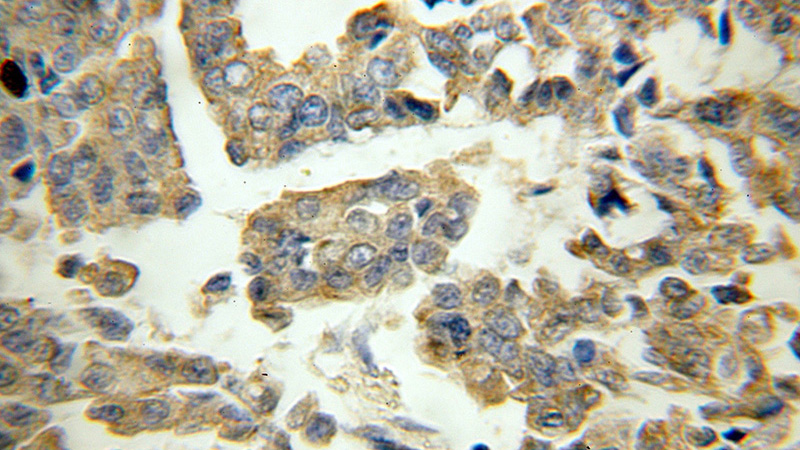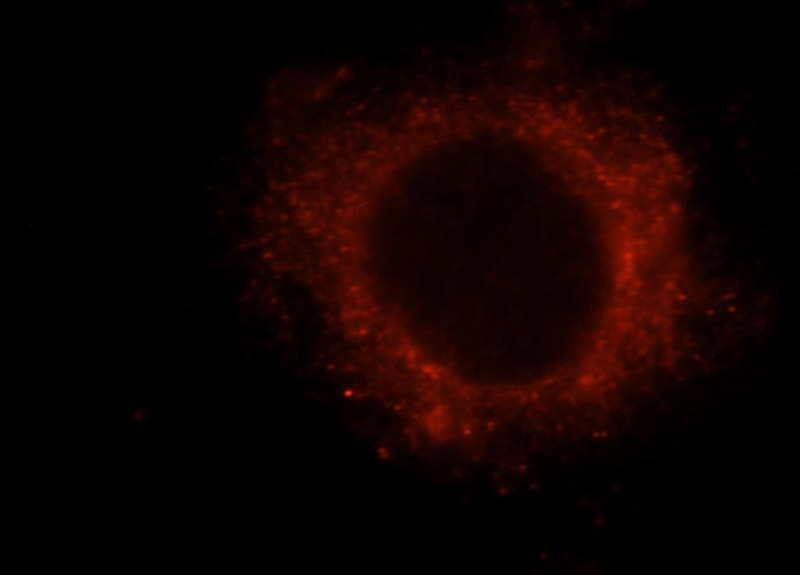-
Product Name
RB1CC1 antibody
- Documents
-
Description
RB1CC1 Rabbit Polyclonal antibody. Positive IF detected in Hela cells. Positive IHC detected in human breast cancer tissue, human testis tissue. Positive WB detected in HeLa cells, Jurkat cells, MCF7 cells, mouse brain tissue. Observed molecular weight by Western-blot: 180-200 kDa
-
Tested applications
ELISA, WB, IHC, IF
-
Species reactivity
Human, Mouse, Rat; other species not tested.
-
Alternative names
RB1CC1 antibody
-
Isotype
Rabbit IgG
-
Preparation
This antibody was obtained by immunization of Recombinant Protein (Accession Number: XM_011517643). Purification method: Antigen affinity purified.
-
Clonality
Polyclonal
-
Formulation
PBS with 0.1% sodium azide and 50% glycerol pH 7.3.
-
Storage instructions
Store at -20℃. DO NOT ALIQUOT
-
Applications
Recommended Dilution:
WB: 1:500-1:5000
IHC: 1:20-1:200
IF: 1:10-1:100
-
Validations

HeLa cells were subjected to SDS PAGE followed by western blot with Catalog No:114585(RB1CC1 antibody) at dilution of 1:1000

Immunohistochemical of paraffin-embedded human breast cancer using Catalog No:114585(RB1CC1 antibody) at dilution of 1:200 (under 40x lens)

Immunofluorescent analysis of Hela cells, using RB1CC1 antibody Catalog No:114585 at 1:25 dilution and Rhodamine-labeled goat anti-rabbit IgG (red).
-
Background
RB1CC1, also named as RBICC, is implicated in the regulation of RB1 expression and functions as a DNA-binding transcription factor. It is a potent regulator of the RB1 pathway and a mediator that plays a crucial role in muscular differentiation[PMID:15968549 ]. Its expression is, thus, a prerequisite for myogenic differentiation. Involved in autophagy. RB1CC1 is required for autophagosome formation [PMID: 19258318]. It is probably involved in the tumorigenesis of breast cancer[PMID: 14533007]. RB1CC1 is frequently mutated in breast cancer and shows characteristics of a classical tumor suppressor gene[PMID: 21602932]. The immunogen of this antibody is C-terminal 154aa of RB1CC1.
-
References
- Ganley IG, Lam du H, Wang J, Ding X, Chen S, Jiang X. ULK1.ATG13.FIP200 complex mediates mTOR signaling and is essential for autophagy. The Journal of biological chemistry. 284(18):12297-305. 2009.
- Wang D, Olman MA, Stewart J. Downregulation of FIP200 induces apoptosis of glioblastoma cells and microvascular endothelial cells by enhancing Pyk2 activity. PloS one. 6(5):e19629. 2011.
- Kim JY, Zhao H, Martinez J. Noncanonical autophagy promotes the visual cycle. Cell. 154(2):365-76. 2013.
- Li X, Wan X, Chen H. Identification of miR-133b and RB1CC1 as independent predictors for biochemical recurrence and potential therapeutic targets for prostate cancer. Clinical cancer research : an official journal of the American Association for Cancer Research. 20(9):2312-25. 2014.
- Ge L, Zhang M, Schekman R. Phosphatidylinositol 3-kinase and COPII generate LC3 lipidation vesicles from the ER-Golgi intermediate compartment. eLife. 3:e04135. 2014.
- Wen J, Yeo S, Wang C. Autophagy inhibition re-sensitizes pulse stimulation-selected paclitaxel-resistant triple negative breast cancer cells to chemotherapy-induced apoptosis. Breast cancer research and treatment. 149(3):619-29. 2015.
- Ma D, Molusky MM, Song J. Autophagy deficiency by hepatic FIP200 deletion uncouples steatosis from liver injury in NAFLD. Molecular endocrinology (Baltimore, Md.). 27(10):1643-54. 2013.
- Wei H, Wang C, Croce CM, Guan JL. p62/SQSTM1 synergizes with autophagy for tumor growth in vivo. Genes & development. 28(11):1204-16. 2014.
Related Products / Services
Please note: All products are "FOR RESEARCH USE ONLY AND ARE NOT INTENDED FOR DIAGNOSTIC OR THERAPEUTIC USE"
